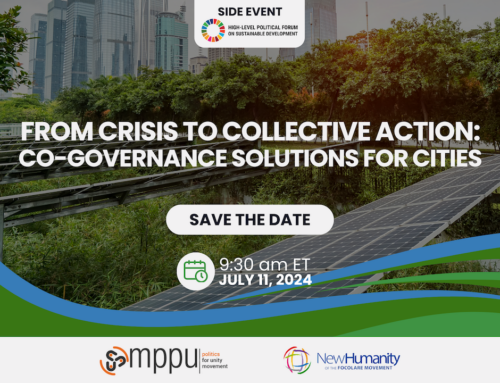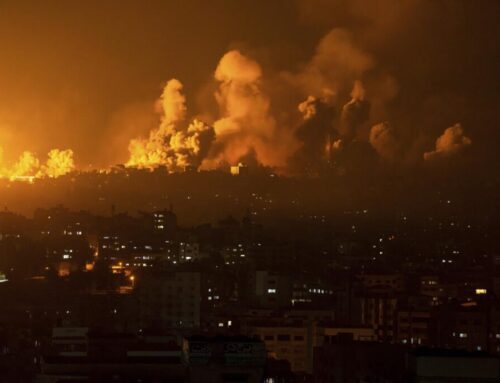As part of the International Online Seminar of the Politics for Unity Movement (MPPU) “Politics and Policies for Unity in the Times of Global Change: Ideas, Commitments, Contributions” that took place on December 10-11, 2020, the co-president of the International Center made an in-depth analysis on what are the questions of the global crisis to politics today. We publish her speech below.
Rèka Szemerkenyi
Transitioning from the painful 20th century with two World Wars and a Cold War, into the 21st century, Humanity was given peace and relative well-being. So much so that ours may be called the luckiest generation in History. With the peaceful end of the bipolar military, economic and ideological confrontation, it seemed that Humankind entered a phase in History which it never had before: an era of peaceful cooperation and a real globalized world. The sudden availability of air travel and the spread of the internet both helped as well as demonstrated the spirit of the new century: peace and prosperity. All promised to make the 21st century the best in human history.
And yet, another set of international developments seem to reveal a rather different trend. Conflicts that security policy calls the unfinished wars of the 20th century erupted and turned into very real, kinetic, military confrontations of the traditional type. Geographically touching almost every continent: in Europe itself in the Balkans, but then in the Middle East, in Central Asia, Afghanistan, Ukraine, Georgia, and then, in Africa… So much so that security experts had to warn that most of the “traditional” military threats remained, after the end of the Cold War. Even the craziest of all, nuclear proliferation, did not dissipate. As the case of North Korea and Iran shows, there continue to be countries that operate with it and invest money into building up their nuclear arsenal.
In addition, new types of security threats appeared, such as energy security and cyberattacks, and had a negative impact on the peaceful life of countries. Even a new type of kinetic aggression had to be added to security considerations: the devastating impact of international terrorism. On large scale, as in the Middle East going as far as creating an alleged state (the Islamic state), or in a more localized way, as the heinous attacks in France, Belgium, Germany, the UK… in Europe continue to show over the last five years, terrorism produced horrifying results and demanded many innocent lives.
What these, often dispersed events show from a larger perspective is that in reality, during this allegedly most peaceful and prosperous period of humankind, none of the “old style” military conflicts dissolved, while “new types” of threats and conflicts became the dominant feature of the global security landscape. But even this is not the full picture yet: during the seemingly peaceful period and parallel to the above security threats, a less visible but nonetheless impactful geostrategic repositioning has been underway. The military buildup in China and in the South China Sea, as well as the militarization of the Arctic area, are signs of very profound changes in the global geo-strategic environment, challenging the very foundations of international law and institutions and threatening peace.
And even this is not the full picture yet: all this is going on while Humanity is finally, but still slowly, starting to realize that the most massive truly global challenges are for real as shown in the three major new developments: military conflicts and inequality of resources have led to an intolerable level of impoverishment and thus contributed to mass migration unseen ever before; climate change seems to have been put on a fast track producing already measurable impacts; and – to make one of security experts’ worst fears a reality, a global pandemic hit the world, with ramifications in every sphere from health through economic, educational, cultural, social, political, international, to the strategic level, and impacting every continent, every country, every family, and even every single person, on planet Earth.
What do these two sets of signs of the Times tell us? Which is the “real” world: is Humanity on the march towards ever growing spheres of freedom, democracy, peace and cooperation, or are we heading towards a series of massive global crises, starting with the pandemic but going toward some very real global conflictual scenarios. What is the proper reaction to these daunting pressures?
To make sure the right answer is given to this question, is the historic responsibility of our generation. Every business question that companies, owners, producers and consumers in the economic sphere face, everything teachers teach, artists create, and most importantly, every issue that decision-makers in the political sphere face, every meeting, every negotiation, international agreement or lack thereof, has to be made with this in perspective. Ours cannot be the generation of decision-makers that lost sight of the big picture, or that, worse yet, was not aware of what is going on in the world around us.
In aiming at this, we got some very important guiding principles from the pandemic. The Covid-19 experience taught a powerful lesson about our vulnerability. Not just as individuals, in health or in psychological terms, but as societies, in social, economic etc. terms. The pandemic should mark the end of the era when humanity thought it was invincible and did not have to respect and honor the laws of Nature. Once the cure is found, the temptation may be to walk away from this lesson. But then, soon enough, the next such lesson will be taught to us by climate change. With the lesson of vulnerability, the pandemic created a new foundation for political thinking and action: it made clear that politics has to start from, as well as aim at, its most basic responsibility of establishing structures, institutions, cooperations, that serve, protect, strengthen and provide for. It taught the powerful lesson that Politics has to be about caring and about service.
The Covid-19 experience taught another very powerful lesson about our interconnectedness. This is a global development that has been noted before the pandemic and has a great literature. There had been many signs for a need to rethink the questions related to political and international organizations prior to the pandemic already and there is a richness of thinking related to these questions. But the pandemic made interconnectedness an organizing force. Now it is the main task for political actors engaged on all levels, to rethink local, national and international institutions, organizations, structures, laws, regulations and values, in a fundamentally innovative way, on the basis of a profound understanding of our, and our societies’, vulnerability and interconnectedness. Understanding the signs of our Times is, really, a Call for innovation and quality in politics.






Leave A Comment